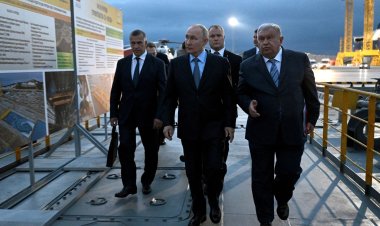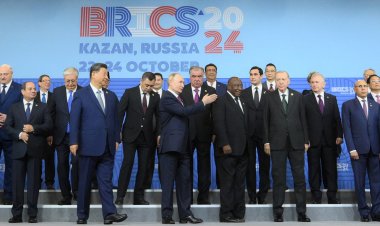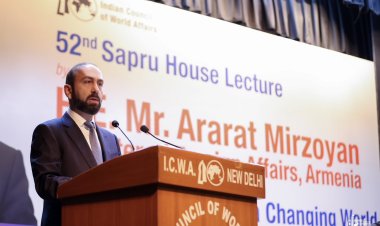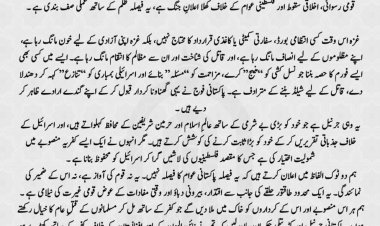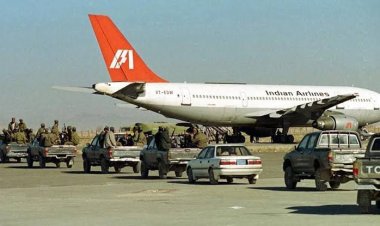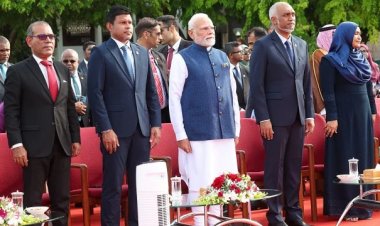Geo-Strategic "Contours" of India-Russia Relations
The visit by Russian President Vladimir Putin to India added a new chapter in strategizing India-Russia relations. Cooperation in the fields of energy, defence, trade and economic relations will certainly strengthen bilateral cooperation. Along with bilateral cooperation, India-Russia relations will certainly provide stability to Asian security in general and Eurasian security in particular.
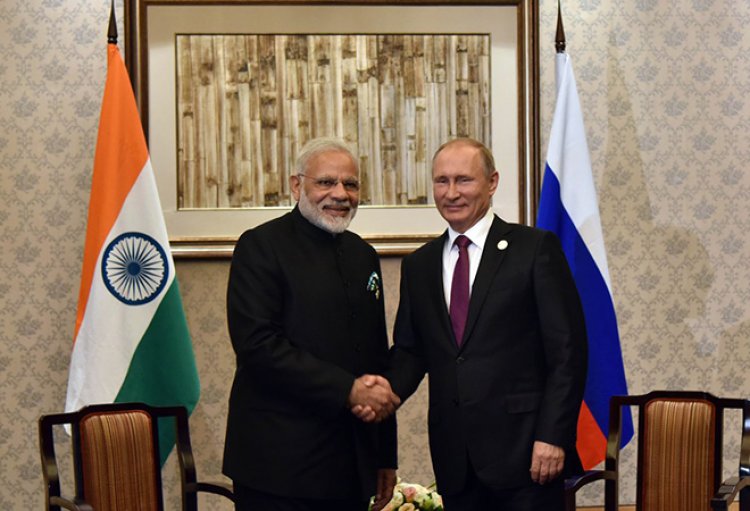
Commentary
The successful visit of Russian President Vladimir Putin to India and the subsequent signing of “India-Russia: Partnership for Peace, Progress and Prosperity” is a milestone event as far as bilateral relations between both countries are concerned. Along with the visit of President Putin, the successful completion of the 2 + 2 meeting of Defense and External Affairs Ministers of both the countries provided an added impetus to strengthening the bilateral relations between both the countries.
The visit of President Vladimir Putin to India has to be examined in the following strategic context. These are a) this marks the fifty years of the “Indo-Soviet Treaty of Peace, Friendship and Cooperation Agreement,” which was signed in 1971 along with the 22 years of the “India-Russia Strategic Partnership Agreement” signed in 2000. The agreement of 2000 was signed when President Putin became President of Russia; b) the visit is taking place in the backdrop of a global crisis due to the horrendous Covid pandemic, which is to a significant extent altering the geopolitical pulse of global security structure; c) the visit is taking place while Russia involves itself in a protracted border conflict with Ukraine considered as a strategic trap for Russia as it is also facing Western isolation over the years on the same issue; d) similarly, Russia-US relations are at their lowest point though it is showing a marked improvement after the Geneva talks; e) finally, the Afghan imbroglio is putting the Russian foreign policy under stress as it is in a dilemma whether to recognize its former nemesis turned friend the radical Taliban or not. It is a well-known fact that Russia is also facing a negative fallout after the Taliban takeover of power in Afghanistan.
One needs to underline here that some of the structural factors, as neo-realist scholars often argue in the International Relations theory parlance, provide a context to Russia’s active engagement in global politics. Similarly, India is also pursuing an active engagement in international affairs and has emerged as a “balancer” of global politics over the years. India’s vaccine diplomacy in the post-Covid 19 era has also won appreciation from the international community. At the same time, India has emerged as the major destination of Foreign Direct Investment (FDI) over the years. The central plank of India’s foreign policy is the notion of “strategic autonomy,” which adds much substance in pursuing active diplomacy at the global level. One may add here that India is also a key player in the emerging security bloc, the Quad and playing a vital role in the emerging Indo-Pacific security structure.
Some of the above analyses provide a backdrop to study India-Russia relations. The same can be studied through three broader geopolitical prisms, namely:
- a) The civilizational context of India-Russia relations provides a base for the fruition of bilateral relationships between the two countries over the years.
- b) The bilateral strategic partnership between India and Russia is also strengthening in recent years.
- c) Strategic cooperation in the field of energy, defence and boosting connectivity between both countries are taking place at a rapid pace.
One can underline here that there is a greater degree of continuity in the bilateral relationship between both the countries, and also, there is also a civilizational thrust as envisaged by Bal Gangadhar Tilak in his book Arctic Home in the Vedas. As various scholarly studies suggest, Panini’s Sanskrit Grammar influenced the Russian language to a significant extent. The notion of Meru Parvat (Mount Meru located in the modern-day Arctic region) as envisaged in India’s classic texts and highlighted by Tilak in the above book reflects civilizational strands of India-Russia relations. Similarly, the travelogue account of the 15th Century Russian traveller Afanshi Nikitini throws much light on India-Russia relations from a historical perspective.
Some of the above strategic developments provide a context to the bilateral relationship between India-Russia. Highlighting the significance of the “21st India-Russia Annual Summit”, Prime Minister Narendra Modi stated that “our Special and Privileged Strategic Partnership has been continuously strengthening.”
The recent visit of President Vladimir Putin to India provided greater teething to the bilateral relationship. The Joint Statement signed between the two countries aptly reflected that “the traditional areas of cooperation are being further strengthened, new drivers of growth have led to diversification and expansion of bilateral cooperation.” The diversification of the bilateral relationship into new frontiers of technical cooperation added trust to the existing trade and economic cooperation between both countries. One noteworthy aspect which added robustness to the existing bilateral relationship is that despite the Covid-19 impact, the bilateral trade relations between both countries grew substantially. The Joint Statement mentions that the bilateral trade has increased substantially by “38% in the first half of 2021”.
One special area that both sides identified is the Arctic Region of Russia. Similarly, cooperation in connectivity projects like the Chennai-Vladivostok Maritime Corridor and the importance of Chahbahar Port also got duly acknowledged in the Joint Statement.
The Joint Statement signed on 6 December 2021 has also emphasized cooperation in the field of “civil nuclear energy,” “education, culture and tourism,” “Science and Technology,” and “Defense cooperation.” The Joint Statement has also underlined “the importance of the reinvigorating multilateralism, with the central coordinating role played by the United Nations in world affairs.”
One important issue which both the countries underlined and which is reflected in the Joint Statement is that “both Sides strongly condemned terrorism in all its forms and manifestations and urged the international community to intensify cooperation against terrorism including safe havens, terror financing, arms and drugs trafficking, radicalization and malicious use of ICTs to spread extremist, terrorist and other illegal content.” The Joint Statement also “expressed concern over the possibility of an arms race in outer space and outer space turning into an arena for military confrontation.”
On the issue of Afghanistan, the Joint Statement has also emphasized “strong support for a peaceful, secure and stable Afghanistan while emphasizing the respect for sovereignty, unity and territorial integrity and non-interference in its internal affairs. They also discussed the current humanitarian situation and decided to provide immediate humanitarian assistance to the Afghan people.”
However, Russia’s pro-active relations with China is a reason for apprehension. This is more so as China faces a global backlash, especially in the post-Covid era. Similarly, Russia- China defence cooperation and the technology transfer by Moscow to Beijing, to a great extent vitiate both Asian security and global security.
The second aspect is Russia’s growing engagement with Pakistan, a worrying cause for concern. It is a known fact that Pakistan is a failed state and provides sanctuary to radical and terrorist groups. Pakistan-based radical and terrorist groups pose a security threat to the regional security of South Asia and the post-Soviet Eurasian space. Despite knowing Pakistan’s nefarious role in vitiating the regional and global security environment, the way Moscow is engaging with Islamabad is a cause of concern. Similarly, reports have emanated from various quarters that Pakistan is trying to obtain “ Dual-use nuclear materials” from Russia. The Russian government should also take stringent measures to curb such illegal activities by Pakistan. So, in this context, Russia needs to rethink its present engagement with Pakistan.
One aspect that needs greater attention is that Russia is slowly changing its foreign policy towards Afghanistan. From its earliest position of all-out support to the Taliban in the aftermath of the post- August takeover of power, Moscow now realizes its mistakes of supporting the radical Taliban. Russia is now emphasizing “inclusive government” and has not recognized the Taliban. The recent change in Russia’s policy postures towards the Taliban will add a new dimension to its Afghan policy.
All in all, the civilization context of India and Russia relations can provide a base for strengthening the bilateral relationship between these two countries.
Disclaimer: This article is the author’s individual scholastic contribution and does not necessarily reflect the organization’s viewpoint.

